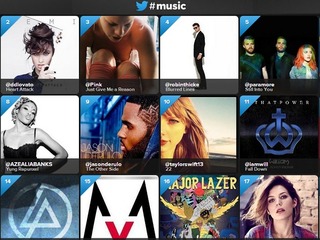Oxford Cancer Analytics raises $11M to detect lung cancer via a blood test
OXcan combines proteomics and artificial intelligence for early detection
Read more...
Twitter co-founder Biz Stone has been remarkably cagey about what his new startup, called Jelly, is all about. But that has not stopped him from raising money from a pretty remarkable roster of investors.
The company raised an undisclosed amount of money in a round led by Spark Capital with additional investment by SV Angel, it was revealed in a blog post Thursday.
In addition to the two investors, Jelly also received funding from a group of high profile individual investor: Square CEO Jack Dorsey; U2 frontman Bono; Reid Hoffman, with the Greylock Discovery Fund; Stone's Twitter co-founder Evan Williams and Jason Goldman via Obvious; former Vice President Al Gore; Emmy winning director Greg Yaitanes; author and entrepreneur Steven Johnson; and Afghan entrepreneur and businesswoman Roya Mahboob.
"We chose angels like Al Gore, a Partner at KPCB and Chairman and Co-founder of Generation Investment Management, Greg Yaitanes, a Hollywood director, and Roya Mahboob, an entrepreneur doing amazing work for women in Afghanistan partly because they work in divergent fields. Knowledge diversity is something we prize highly and is also something that will be represented in our product," Stone wrote in the post.
The funding will be used "to hire more great talent and continue building what we think of as the natural next step for our connected society. "
Along with the fundraising, Jelly also announced that Spark General Partner Bijan Sabet has joined the company's board of directors.
So what is Jelly, exactly? That, my faithful reader, is the big mystery. All I can say is that it seems to have something to do with mobile.
"As mobile devices have taken an increasingly central role in our lives, humanity has grown more connected than ever—herein lies massive opportunity," said Stone.
Also, it was named after the jellyfish "because neurologically, its brain is more 'we' than 'me'" according to Stone.
Beyond that, it is anyone's guess, though Stone promises to share more information about the company when it is able to "move beyond early prototyping."
Jelly was co-founded by co-founded by Ben Finkel, who also co-founded Q&A service Fluther, where Stone had been an advisor. The startup was eventually acquired by Twitter. Finkel is the company's CTO.
Since the existance of Jelly was first announced in April, it has added two employees: engineer Austin Sarner, who helped develop Push Pop Press before it was sold to Facebook; and the Head of Twitter's recently released #Music app Kevin Thau.
Beyond just what exactly Jelly is, there is another question swirling around the company: will Stone be forced to leave Medium, the publishing platform he and Williams launched in August 2012? That project seems like it is more of Williams' baby than Stone's, so perhaps Jelly is his chance to pursue his passion as well.
But, like just about everything else regarding Jelly, we will just have to wait and see.
(Image source: https://animalssafairs.blogspot.com)
OXcan combines proteomics and artificial intelligence for early detection
Read more...Nearly $265B in claims are denied every year because of the way they're coded
Read more...Most expect to see revenue rise, while also embracing technologies like generative AI
Read more...Startup/Business
Joined Vator on
Twitter is an online information network that allows anyone with an account to post 140 character messages, called tweets. It is free to sign up. Users then follow other accounts which they are interested in, and view the tweets of everyone they follow in their "timeline." Most Twitter accounts are public, where one does not need to approve a request to follow, or need to follow back. This makes Twitter a powerful "one to many" broadcast platform where individuals, companies or organizations can reach millions of followers with a single message. Twitter is accessible from Twitter.com, our mobile website, SMS, our mobile apps for iPhone, Android, Blackberry, our iPad application, or 3rd party clients built by outside developers using our API. Twitter accounts can also be private, where the owner must approve follower requests.
Twitter started as an internal project within the podcasting company Odeo. Jack Dorsey, and engineer, had long been interested in status updates. Jack developed the idea, along with Biz Stone, and the first prototype was built in two weeks in March 2006 and launched publicly in August of 2006. The service grew popular very quickly and it soon made sense for Twitter to move outside of Odea. In May 2007, Twitter Inc was founded.
Our engineering team works with a web application framework called Ruby on Rails. We all work on Apple computers except for testing purposes.
We built Twitter using Ruby on Rails because it allows us to work quickly and easily--our team likes to deploy features and changes multiple times per day. Rails provides skeleton code frameworks so we don't have to re-invent the wheel every time we want to add something simple like a sign in form or a picture upload feature.
There are a few ways that Twitter makes money. We have licensing deals in place with Google, Yahoo!, and Microsoft's Bing to give them access to the "firehose" - a stream of tweets so that they can more easily incorporate those tweets into their search results.
In Summer 2010, we launched our Promoted Tweets product. Promoted Tweets are a special kind of tweet which appear at the top of search results within Twitter.com, if a company has bid on that keyword. Unlike search results in search engines, Promoted Tweets are normal tweets from a business, so they are as interactive as any other tweet - you can @reply, favorite or retweet a Promoted Tweet.
At the same time, we launched Promoted Trends, where companies can place a trend (clearly marked Promoted) within Twitter's Trending Topics. These are especially effective for upcoming launches, like a movie or album release.
Lastly, we started a Twitter account called @earlybird where we partner with other companies to provide users with a special, short-term deal. For example, we partnered with Virgin America for a special day of fares on Virginamerica.com that were only accessible through the link in the @earlybird tweet.
What's next for Twitter?
We continue to focus on building a product that provides value for users.
We're building Twitter, Inc into a successful, revenue-generating company that attracts world-class talent with an inspiring culture and attitude towards doing business.

Joined Vator on

